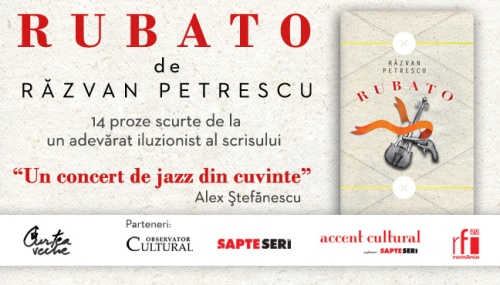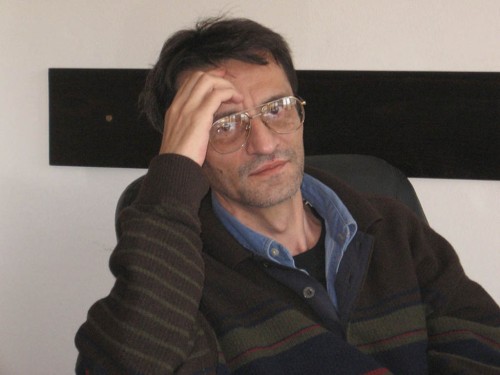Razvan Petrescu’s Rubato: The Coordinates of World-class Romanian Fiction
by Claudia Moscovici
Despite charting very unfamiliar territories in fiction, the writer Razvan Petrescu is quite familiar—and famous—in his native country, Romania. A versatile and award-winning author, Petrescu is an essayist, fiction writer and playwright. Among his numerous literary prizes, he won the award Book of the Year at the National Salon of Books in Cluj; a fiction award for The Farce (Farsa, Editura Unitext, 1994) from the Association of Writers in Bucharest (Asociatia Scriitorilor din Bucuresti); the award UNITER for the best play of the year, Spring at the Buffet (Primavara la buffet, Editura Expansion, 1995), and the Prose Prize given by Radio Romania Cultural. Some of his works have been translated into Hebrew, Spanish and will be soon translated into English as well.
Traddutore Traditore
I have to admit, however, that I don’t envy the translators’ job, which I’m sure is very challenging. They say that poetry is the most difficult genre to translate, but in my opinion fiction that is unique in content and employs stylistically many dialects—such as the writing of Ion Luca Caragiale, Romain Gary and Razvan Petrescu–is the most difficult kind of literature to translate. And yet, that is usually also the most noteworthy and ingenious fiction. My main goal in this review is to convey the fact that Razvan Petrescu is a world-class author to an international audience, which may not be familiar with the Romanian language or with Romanian literature. How will I go about doing that? In mathematics or geography, you pinpoint a location, however remote or difficult to find, in terms of known coordinates. There’s no equivalent precise guide in the arts and humanities, however. The best I can do to offer such coordinates is to explain the relatively unfamiliar in terms of the relatively familiar: canonized authors that everyone knows; psychological fiction; universal themes and philosophical currents. The book I’ll be discussing here is Rubato (Curtea Veche Publishing, 2011), which is a collection of several of Razvan Petrescu’s prize-winning short fiction, published from 1989 to 2003. Rubato is like an album of the author’s best hits, if you will, but it is also far more than that: it’s world-class fiction, comparable, I believe, to the works of legendary writers like Franz Kafka and Jorge Luis Borges.
Unique, uncategorizable fiction
Most fiction writers can be integrated rather easily into a genre, a movement or a style: be it realism, fantasy, horror, or magical realism. There are a few writers, however, who are so quirky in style and unique in content that they’re almost impossible to categorize in terms of any neat and familiar literary labels. Franz Kafka and Jorge Luis Borges are two of my favorite authors among those. How do you attach a label to Kafka’s psychological realism of the subconscious and dream; to what do you compare Borges’ mathematical paradoxes translated into a puzzling fiction? I think Razvan Petrescu’s Rubato fits into this uncategorizable category of fiction. Which is why I believe that the best way to describe it to those who haven’t read it yet is in terms of equally innovative and quirky authors, such as Kafka and Borges. What Rubato shares with, for instance, Kafka’s The Castle (1926) is a psychological realism that goes far beyond—and beneath—the layers of our conscious reality.
The psychological realism of the subconscious
If Kafka’s The Castle (1926) or The Trial (1925) feel so real to us it’s not because they are actually realist in either content or style. It’s because these works focus so well on our unconscious fears—of powerlessness and alienation in a modern, bureaucratic society—that they bring them to the surface of our awareness. In reading the works of Kafka, we face our misgivings and fears, confront them and even laugh at them, since they appear absurd. Yet we no longer minimize them and are unable to shove them back under the rug, into the unconscious, to dismiss them. That’s why the works of Kafka remain so eerie and unsettling to us. Despite their sense of the absurd and humor, they’re as far removed as possible from superficial farce. The same phenomenon is at work when you read Razvan Petrescu’s Rubato. This slice of life tale depicts a psychiatrist’s “normal” day at work, which is full of abnormalities.
All sorts of patients come in and out of his office, including a security officer/spy, a prostitute suffering from venereal diseases and a woman with psychopathic tendencies, who likes to torture and kill birds. Though they are all quite severely disturbed, the readers can’t help but laugh when reading their plights. The security officer has stinky feet and a very shallow conscience; the prostitute takes her clothes off and asks the psychiatrist to cure her venereal diseases; while the sadistic woman that likes to torture birds is beat at her own game (cruelty), as the psychiatrist admits to being more weird than her (and better at “befriending” and then killing birds as well). The name of the game for each of the characters is a complete detachment from the elements that render us human (empathy, caring, emotion, deep and meaningful connections to others). Despite this serious psychological deficiency, the tone of the narrative is so realistic in its style—the dialect and mannerisms of speech of each character constitute in themselves masterpieces of modern fiction—that the reader too becomes somewhat detached and laughs at them. Yet in laughing at them we also laugh at ourselves. Razvan Petrescu captures the most disturbing elements of the human condition through a series of hallucinatory characters, dialogues and diatribes that simultaneously appear absurd and implausible yet also seem more real than our daily, conscious reality. How does he do that? Through what may be called “laughter through tears,” that authors like Ion Luca Caragiale, Anton Chekhov and Shalom Aleichem are best known for.
Laughter through tears: Neither satire nor irony
The kind of narrative that establishes layers of psychological distance among the narrator, characters and readers in literature is usually described as “satire” or “irony”. But like Anton Chekkov, Ion Luca Caragiale or Shalom Aleichem’s fiction, Rubato provides neither: or rather, it offers much more than that. Irony and satire are rhetorical stances that assume a position of superiority towards the characters and their actions from the narrator and/or author and readers. Authors that rely heavily on irony often ridicule the characters’ weaknesses and follies. I see no evidence of any narrative sense of superiority or authorial arrogance in Rubato. When we laugh at its characters, we realize we’re also laughing at ourselves. Hence the sense of unease that accompanies Rubato’s keen and pervasive sense of humor, which brings to light our phobias, perverse desires, abnormality and insecurities.
Even more disturbingly, Rubato constantly reminds us of the fragility of human life and of our mortality. Scenes of death and decay pervade Razvan Petrescu’s fiction. No matter how theatrical and comical the depictions of illness and death may be, unlike the scenes we see on the daily news, they still touch and disturb us psychologically. With a sense of indulgence and even love for humanity—and placing himself on the same plane as his characters and readers–the author opens up, like a doctor, the worst of our human qualities and examines them closely, one by one. We greet this complex process with mixed emotions–laughter, horror, revulsion and indulgence–because in these narratives, like in a hallway of mirrors, we see reflections of our inner lives.
Love, misogyny and women
In a recent interview with Esquire Magazine (Romania), Razvan Petrescu described himself—tongue-in-cheek, of course–as a “misogynist womanizer.” I’ve never in my life met a misogynist who admits to hating yet needing women. Misogynists tend to hide their contempt for women under the pretext of loving them (a technique common for psychopathic seducers) or of respecting certain women (such as mothers or the “virtuous” few) and hating all the rest. There’s no trace of such underlying misogyny in any of Petrescu’s works. What we find in Rubato, for instance, is a compelling depiction of fear of the object of desire. This fear is a far cry from Arthur Schopenhauer or Henry de Montherlant’s flagrant and self-righteous misogyny. Many gorgeous, sexy women populate Petrescu’s fiction. Their erotic power is attenuated by humor; their emotional appeal is neutralized by fear.
In the short story The Door (Usa), for instance, a mother and a daughter exchange worried whispers about their husband/father, who is dying on a hospital bed in an adjacent room. The doctor, about to go to a surgery and utterly indifferent to his patient’s plight, attempts to persuade the two women to take the moribund patient back home. There’s nothing he can do for him at the hospital anymore. Rather than worrying about the poor state of health of the patient, the two women debate in hushed voices the cost of transporting the ill man home. The patient overhears the whole conversation through a slightly cracked door. He expires, in a scene as vivid but more concise than Tolstoy’s The Death of Ivan Ilych (1886), knowing that he’s neither appreciated nor loved by his wife and his daughter. Razvan Petrescu’s fictional world is filled with such uncaring women, indifferent doctors, loveless marriages and spoiled children. They show the following thought experiment in action: When cynicism is pushed as far as it can go, it becomes psychological realism.
Cynicism versus nihilism
There’s no doubt that Razvan Petrescu’s fiction is pervaded by an underlying sense of cynicism. Not nihilism, but cynicism. Nihilism, or the questioning and negation of human ideals and values, may be great for philosophy—think Nietzsche—but it can be awfully boring and preachy when we encounter it in fiction. Who needs a dissertation on the meaninglessness of life and human values from some uppity character delivering lectures from up high, on a pedestal? Cynicism, on the other hand, tends to be a very welcome perspective in fiction. It avoids both the unforgivable naiveté of idealism and the arrogance of nihilism. Of course, in modern usage, cynicism has little to do with the original Greek Cynics, who believed that the purpose of life was to live a virtuous and modest life, deprived of unnecessary luxuries: in other words, a life in accordance to Nature. Perhaps modern Cynicism uses as its frame of reference only the most comical and extreme of the Cynics—Diogenes of Sinope—who rejected his society, begged to survive, and lived in a stone jar in the marketplace. Either way you look at it, cynicism offers a critical perspective of the human condition and of our societies with enough humor and sense of the absurd that even humanists can take it. Written in a dramatic, hallucinatory and utterly engaging polyphony of dialects (and characterizations); confronting our deepest fears and flaws with a disarming honesty and contagious cynicism; probing psychologically the limits of our humanity and moral values, Razvan Petrescu’s Rubato is a masterpiece of world (not just Romanian) literature.
Claudia Moscovici, Literature Salon








